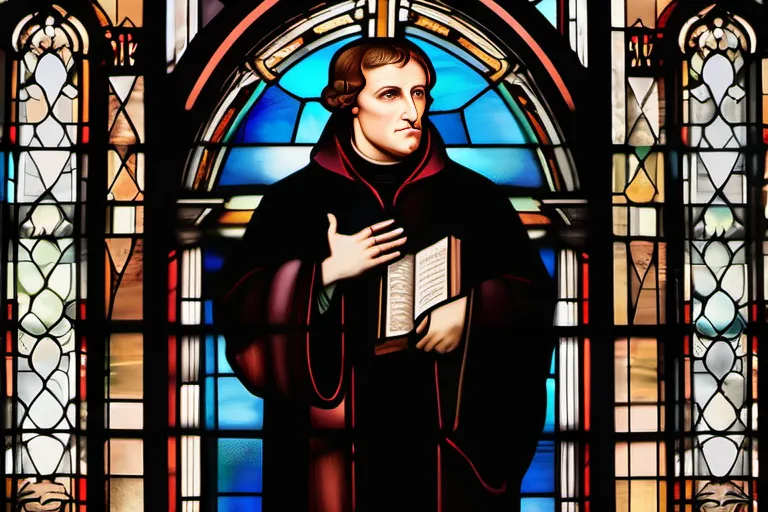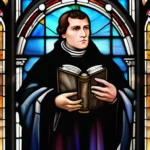Explore the fundamental beliefs, history, and practices of the Lutheran Church.
The Lutheran Church is one of the largest Christian denominations in the world. This article provides a comprehensive overview of its beliefs, history, and practices. From the Reformation to contemporary times, we delve into the key tenets that define this faith.
The Reformation and the Birth of Lutheranism
Imagine standing at a crossroads, where centuries-old traditions meet the winds of change. This was the scene for Martin Luther in the early 16th century. The Lutheran Church began its journey through the tumultuous period known as the Reformation, a pivotal moment that forever altered religious landscapes.
It all started with an act of defiance: Luther nailing his famous Ninety-Five Theses to the door of the Wittenberg Castle church in 1517. These theses were a series of scholarly questions and debates on the practice of selling indulgences, which was seen as corrupt by many reformers like Luther.
But why did this matter? Think about it: if you believed that salvation could be bought with money, wouldn’t you feel betrayed when someone challenged that notion? Luther argued that salvation is a gift from God and not something one can purchase. He emphasized that faith alone, apart from good works, leads to righteousness before God.
The impact was explosive. Other scholars and thinkers rallied behind his cause, seeing an opportunity for reform in both practice and doctrine. Figures like John Calvin emerged with their own interpretations, but Luther’s ideas stuck because they resonated so deeply. The Lutheran view became a beacon of hope for those seeking purity in worship and devotion.
The Reformation was more than just a theological debate; it was a social revolution. People started questioning not only church practices but also societal norms, paving the way for modern religious freedoms and individual rights. Lutheranism spread quickly across Europe through translated Bibles and printed materials, empowering people to read and understand their faith directly.
So, as you stand at that crossroads, ponder: how did a simple act of defiance give rise to one of the largest Christian denominations today? The Lutheran Church, born in the crucible of change, continues to thrive with its unique blend of ancient faith and modern understanding. Its journey is not just a part of history; it’s a story that echoes through time, reminding us of the power of truth and the importance of questioning established norms.
Lutheran Beliefs: Salvation by Grace Alone
Lutheran beliefs, particularly the doctrine of salvation by grace alone, are like a beacon guiding souls through the murky waters of doubt and fear. Have you ever wondered how one can truly be saved? How does one enter into that holy relationship with God, and what role do good deeds play in this process?
In Lutheran theology, salvation is a gift from God, bestowed upon us not because of our efforts but through faith alone. This concept, ‘sola fide,’ means that faith is the only way to receive God’s grace and forgiveness. It’s as if salvation is a precious gem hidden in a field, and once found, it belongs solely to the one who discovers it, not because of their worthiness but simply by believing.
The idea of justification by faith alone (sola fide) challenges the notion that works can earn salvation. Lutherans argue that good deeds are a result of faith, not the cause of it. Imagine planting seeds in fertile soil; the growth is natural and comes from the life within the seed itself. Similarly, faith brings about good works, but they do not determine one’s standing with God.
However, this doesn’t mean that Lutheran churches encourage a complacent attitude or a lack of action. On the contrary, the call to live out one’s faith in every aspect of life is a central part of Lutheran practice. It’s like walking a tightrope; while the rope (faith) holds you up, your steps and balance (good works) are essential to keep you moving forward.
So, as we explore further into Lutheranism, remember that this belief system is not about achieving perfection but about trusting in God’s grace. It’s a journey of transformation where every step, whether big or small, is guided by the light of faith.
The Role of Scripture in Lutheranism
The Bible, for Lutherans, is more than just a book; it’s like the heart of their faith, pulsating with life and truth. How do they see its authority? Is the Bible merely a historical document or does it hold a central role in Lutheran theology?
Lutherans believe that the Bible is the word of God, delivered through human authors under the inspiration of the Holy Spirit. This means every page carries divine weight and guidance. But how do they apply this belief to their lives? Is there a practical way to understand and use the Bible in Lutheran practice?
In Lutheran churches, the Bible is not just read; it’s proclaimed with authority. During services, passages are read aloud, often followed by preaching that digs deep into scripture. This practice underscores the idea that the Bible provides clear guidance for every aspect of life—how to think, act, and interact with others.
But Lutheran belief in the Bible extends beyond just reading and hearing it. It involves living it out. For Lutherans, faith without works is dead (James 2:17). This means that biblical teachings are not just academic knowledge but practical guidelines for daily life. From treating others with kindness to seeking justice, the Bible shapes Lutheran ethics and behavior.
How do they reconcile complex passages? Aren’t some parts of the Bible hard to understand or even contradictory? Lutherans often turn to other scriptures to find clarity. They also rely on tradition, particularly the teachings of Martin Luther himself, to guide their interpretation. This balanced approach ensures that while the Bible is central, it’s not isolated from the wisdom of past spiritual leaders.
In essence, for Lutherans, the Bible is a living, breathing entity that guides and challenges them daily. It’s not just about what you read but how you act based on those readings. This belief system has profound implications for Lutheran worship, where scripture is central, and for their everyday lives, shaping how they treat each other and engage with the world.
Lutheran Sacraments: Baptism and Communion
Imagine you’re standing at the edge of a vast river, looking into its clear, refreshing waters. For Lutherans, baptism is like stepping into that river for the first time—a symbolic journey marking not just the beginning but the renewal of one’s spiritual life. This sacrament isn’t merely about washing away physical dirt; it’s about cleansing our souls from sin and welcoming us into God’s grace.
Baptism in Lutheranism is seen as a covenant between God and the believer, much like a parent promises to care for their child. It’s not just for infants but can be received by anyone at any age, signifying a fresh start and a commitment to follow Christ more faithfully. The act of baptism symbolizes dying with Christ to our old selves and rising with him to new life—a daily reminder that we are reborn in the eyes of God.
Communion, on the other hand, is like sitting down at a communal table. It’s not just about eating bread and drinking wine; it’s a celebration of Christ’s sacrifice and a way to unite us with each other and with Christ. In this act, Lutherans see the real presence of Jesus Christ, who transforms the elements into his body and blood. It’s more than just a meal—it’s a profound moment of worship where we remember Christ’s commandment to love one another and share in his sacrifice.
Both baptism and communion are central to Lutheran worship because they serve as visible reminders of God’s covenant with us. They remind believers that salvation is not about our own efforts but the grace freely given by God. Through these sacraments, Lutherans find a tangible connection with their faith, making it more than just words on a page—it becomes a lived experience.
The Lutheran Church Today: Contemporary Issues
Today, the Lutheran Church finds itself at a crossroads, navigating through contemporary issues that challenge its faith and practices. One of these key challenges is ecumenical dialogue. How can Lutherans engage with other Christian denominations to foster unity in diversity? The metaphor of a ship sailing on turbulent waters aptly describes the journey; it requires careful navigation and open hearts to reach common ground without losing sight of its mission.
The Lutheran Church is also deeply involved in social justice. How do we, as Lutherans, address issues like poverty, racism, and inequality? The church’s response to these challenges can be seen as a mirror reflecting the world around it. Is it enough to simply attend services on Sundays, or must faith be lived out through actions that advocate for those who are marginalized? This question echoes the call of Jesus to love one’s neighbor, urging Lutherans to take concrete steps towards justice and equality.
A significant issue within the Lutheran Church today is the role of women in ministry. How do we view women’s contributions and leadership within our churches? This is akin to a puzzle with many pieces, each representing different perspectives. Some see it as a natural progression towards full equality, while others fear a shift away from traditional roles. The church must carefully consider how to integrate these views without compromising its core beliefs. It’s like threading a needle; every move matters and must be deliberate.
In this journey of contemporary issues, the Lutheran Church is not just responding but actively shaping the future. How do we balance tradition with innovation? Can we find new ways to connect with younger generations while staying true to our roots? These questions are crucial as they influence how Lutherans engage with the world today and tomorrow.
Lutheran Worship: Music, Liturgy, and Tradition
Lutheran worship is like a vibrant tapestry, rich in tradition and deeply rooted in faith. It’s not just about singing hymns or following a set of rituals; it’s a profound expression of spiritual life and community. Have you ever wondered how Lutheran music intertwines with the liturgy to create such an immersive experience? The music in Lutheran worship serves as a bridge, connecting the congregation to their faith through melodies that resonate deeply in the heart.
Imagine walking into a Lutheran church on a Sunday morning, surrounded by people who are not just worshipping but participating in a sacred ceremony. The liturgy is structured yet flexible, allowing for personal reflection and communal celebration. Each service follows a pattern that has been refined over centuries, yet it remains ever-evolving to meet the needs of contemporary believers.
One cannot speak about Lutheran worship without mentioning its emphasis on tradition. From the use of vestments worn by clergy to the sacraments of baptism and communion, these practices are more than just rituals—they are a tangible link to the past and a commitment to the future. The liturgy itself is a blend of ancient texts and modern hymns, creating a dynamic and meaningful experience for all participants.
But what truly sets Lutheran worship apart is its focus on community. It’s not just about the individual’s journey towards God; it’s also about how believers support each other through their shared faith. The pastor serves as a guide and shepherd, but the congregation itself is an active participant in the service, offering prayers, readings, and hymns that reflect their collective spirit.
So, why does Lutheran worship matter? It matters because it’s a living expression of faith, combining the wisdom of centuries with the urgency of today. As you sit in the pews or stand in the sanctuary, the music, liturgy, and traditions come together to create an environment where spirituality meets community, making every service a unique journey of discovery and renewal.
Conclusion
 Understanding the Lutheran Church requires an appreciation for its rich history and core beliefs. By examining its unique perspective on salvation, sacraments, and the role of Scripture, you will gain a deeper insight into this important denomination.
Understanding the Lutheran Church requires an appreciation for its rich history and core beliefs. By examining its unique perspective on salvation, sacraments, and the role of Scripture, you will gain a deeper insight into this important denomination.











